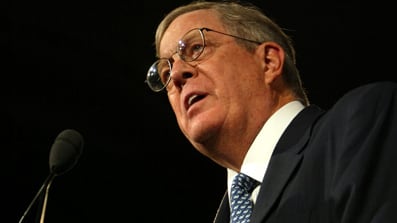David Koch is fuming about a New Yorker article accusing him of using his fortune to secretly fund an anti-Obama insurgency. In an exclusive interview, he tells Elaine Lafferty what they got wrong, why he's so misunderstood, and denies funding the Tea Party.
Update: An editor's note has been appended to this article.
David Koch is steaming.
“It's hateful. It's ludicrous. And it's plain wrong.”
The object of his ire is a 9,963 word story in The New Yorker magazine, published last week which accuses David, his brother Charles, and Koch Industries of…well, just about everything: Secretly funding the Tea Party movement, secretly manipulating the Smithsonian, along with, not-so-secretly polluting the planet, stealing oil from Native American land, denying the existence of climate change, and promoting carcinogens—all in the self-interest of making further billions.

Another profile in July, this one in New York Magazine, described Koch as “the Tea Party’s wallet."
The news alert that a businessman with a personal net worth estimated at nearly $18 billion might wield political influence seems to have shocked, shocked, the media. Cue Rachel Maddow, who went on a televised tear, and the rest is Twitter.
Perhaps this wasn’t the Pentagon Papers, but it seemed that there had been an unraveling of sorts—after all, the title of last week’s New Yorker piece was “Covert Operations.”
“If what I and my brother believe in, and advocate for, is secret, it's the worst covert operation in history,” Koch says, in reference to the New Yorker headline, adding that a lengthy letter to the magazine, rebutting nearly every allegation in the story is in the works. (Koch Industries has already issued a " Response to Recent Media Attacks.")
The origins of “the Billionaire who Secretly Funds the Tea Party” narrative seems to be his connection to Americans for Prosperity, an organization he founded six years ago, whose message is indeed aligned with the Tea Party movement’s message of less tax and more-efficient government. But, he says, no one from the Tea Party movement has ever approached him for money, and when I ask him straight up if he’s funding the Tea Party, all he says is, “Oh, please.”
In doing the profile, the New Yorker had repeatedly tried to reach out to Koch for comment but to no avail.
According to the New Yorker piece, even the president himself seems to think there are nefarious connections to uncover.
In her New Yorker piece, Jane Mayer cites President Obama pointing to Americans for Prosperity as one of those particularly sinister groups with “harmless-sounding names” that may be up to no good. “They don't have to say who, exactly, Americans for Prosperity are,” Obama said at a Democratic fundraiser in Texas last month. “You don't know if it's a foreign-controlled corporation” or “a big oil company,” he said, ignoring that, on the AFP website, staff and principals are named, and that the organization files, as required by law, federal 990 IRS disclosure forms.
“If what I, and my brother believe in, and advocate for is secret, it's the worst covert operation in history.”
A few weeks later, during a conference call with reporters, a senior White House economics adviser mentioned Koch’s company during a discussion of the structure of corporations and tax liabilities. The unveiled reference to a specific company's tax returns—and especially to the tax status of a privately held company—was rather stunning to several on the call.
And to simply characterize Koch as a Democratic detractor, and a Republican right-winger, would be, well, simplistic. While they have been politically active for more than 30 years, largely funding Republicans, they have never been identified with conservatives on hot-button issues such as gay marriage or abortion. He and his wife Julia have contributed $74,900 to New York Attorney General Andrew Cuomo's Democratic campaign for governor, according to Ira Stoll at www.FutureofCapitalism.com. Politico.com reported that KochPac has contributed $196,000 to Democrats in the 2010 election cycle alone, including $30,000 to the Democratic Senatorial Campaign Committee.
The Political Economy Research Institute at the University of Massachusetts at Amherst Center describes Koch Industries as a top polluter. But then its polluters list seems to include almost any company that still manufactures stuff in the U.S., including Ford Motor, General Motors, GE, Pfizer, Eastman Kodak, Sony, Honeywell, Berkshire Hathaway, Kimberly Clark, Anheuser Busch, and Goodyear. Furthermore, Koch Industries has supported environmental causes, among other things, donating 682 acres in Oregon to The Nature Conservancy.
But none these accusations—covertly supporting the Tea Party movement, polluting the planet, stealing oil and being a climate-change denier—bother him as much as this: It is the suggestion that his position as a member of the National Cancer Advisory Board, an arm of the National Cancer Institute, presents a “conflict of interest” because Koch Industries has lobbied against the classification of formaldehyde as a carcinogen.
It is this accusation which has prompted the normally press-shy Koch to take my call.
For Koch, cancer is personal. He serves on the board of Memorial Sloan-Kettering Cancer Center—he donated more than $40 million to the center—and he is, as we’re speaking on the phone, actually at a NCAB meeting in Bethesda, Maryland.
“I can't ignore that allegation, “Koch says. “I've been on this board for six and half years and I've attended about 75 percent of the meetings. The board makes recommendations to the National Cancer Institute regarding gifts and grants to support research endeavors. They aren't responsible for scientific reviews or for providing input on scientific recommendations.” His voice rises. “I have never been in a meeting where the classification of formaldehyde issue has arisen, nor have I tried to influence its evaluation. It's an outrageous accusation.”
I ask Koch about his own prostate cancer, which was discovered too late for a cure, and for which he still undergoes treatment.
“I have been living with this for 20 years after being told I had only a few years to live. It is not pleasant, but I am alive. I am surrounded by love and support, the best wife and partner any man could hope for, and children who delight me every day. I'm a grateful man. The money that I give for cancer research is one of the most important aspects of my life.”
For the record, in addition to the $40 million to Memorial Sloan Kettering Cancer Center, Koch has given $120 million to cancer research at the Massachusetts Institute of Technology, $35 million to Johns-Hopkins Medical Center, and $30 million to the MD Anderson Cancer Center.
He has even urged his three children—David Jr., 12, Mary Julia, 9, and John Mark, 4—to watch the Stand Up for Cancer Special on television, in which survivors share their stories.
“You know, once you've stood up to cancer, everything else feels like a pretty easy fight. I am not going to be silenced. I believe in what this country stands for and I'll keep at fighting for what I believe in for as long as I am alive,” he says.
Editor's note:
The Daily Beast regrets not contacting Jane Mayer directly before the posting of this article. The writer contacted The New Yorker PR department on Sept. 9 via phone and email, submitting questions for Mayer, but The Daily Beast posted the article before she responded.
The New Yorker made extensive efforts to allow David Koch to respond during the reporting of their article. The Daily Beast also should have noted that the writer who interviewed Koch had been a consultant for the McCain/Palin campaign as well as the Hillary Clinton campaign in 2008.
Elaine Lafferty is a former staff correspondent at Time magazine and the Irish Times, features editor at More magazine, and editor in chief of Ms. magazine. She is co-author of My Turn at the Bully Pulpit with Greta Van Susteren.





